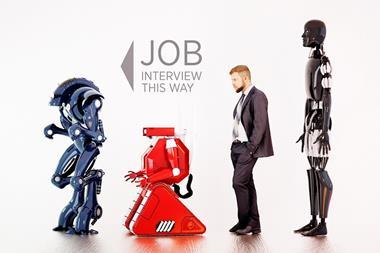Get your risk containment strategies wrong, and watch your share price fall. Sam Parkhouse looks at the relationship between strategy and share performance, and charts some examples of business decisions which turned out to be costly
Banks are no strangers to bouts of unpopularity. When you're in the business of making your money out of counting other people's, you need a thick skin. With corporate governance rules putting a formal and tangible onus on directors to have hands-on responsibility for managing risks, these skins need to be even thicker.
But Barclays Bank and its directors seem to excel themselves in stirring up hatred. In times of recession, our banks in general at least kept shareholders happy. They did this with secure profits and dividends while other sectors of the market failed. But in the early iggo's recession, Barclays somehow managed to be both unpopular and unprofitable. And adverse sentiment was encouraged further by the aloofness of the then chairman and top directors, who came from a long line of a few families who had control of the bank handed down through the generations.
Today, Barclays' top brass has gone further and upset everybody. In a nutshell, it has taken a commercial decision, to close 171 branches, that it was entitled to take. But the decision has been handled so ineptly, and at a time when Barclays has managed the affairs of its top team so badly, that the mix has brought public outrage.
First, let's remember the long search for a chief executive to replace the Martin Taylor era. Taylor received £1 million when he resigned after a period of poor share price performance. An American, Mike O'Neil, was appointed but did not last beyond his first day because of ill health. He also received substantial compensation, lust imagine what bank clerks earning £10,000 to £18,000 a year felt when they learned of these huge pay-outs - on top of the cost of head-hunters and consultants.
Second, remember Barclays has paid £1.76m to Sir Peter Middleton for his roles as chairman and caretaker boss, while the new chief executive, Matt Barrett, who joined in October from Canada, got £i.35m for the last three months of 1999.
Third, Barclays has been axing thousands of jobs while closing local branches. This branches cull has upset even the bishops. It comes also after Barclays led the move to charge for cash machine use and after the banking regulator accused banks of overcharging customers by up to f 5bn a year.
"We will continue to take value maximising decisions without sentimentality or excuses," said Barrett in a letter to staff. While on the subject of the unpopular run of decisions, he conceded they had "opened up questions about our brand and our values."
What had the directors taking these decisions thought about the long term consequences? We can only speculate. These consequences may be important because there is a real risk that Barclays has snubbed out a future stream of customers through its public relations disasters. Furthermore, Barclays is at risk of losing high quality staff. Given the choice, who would want to work for a bank that has an insensitive and arrogant image?
If commercial gains outweighed the risks of bad sentiments, the market would warm to Barclays' shares. But, from a high point of 2,024p in 1999, they have come down to nearer i,6oop in the last year.
Genetically modified (GM) foods
Directors have to demonstrate to their shareholders that they have assessed the risks attached to all their assets and activities, and have taken action to limit or remove their exposure to risk in each area. And it is in "green and ethical issues" that companies have suffered. The biggest domestic row recently has been over genetically modified (GM) foods. The international group Monsanto has been the most obvious loser in terms of its corporate health. According to environmental pressure group, Forum for the Future, Monsanto was perceived as the prime culprit responsible for the wave of bad publicity over GM crop trials. Its "atrocious handling of the issue" led to a 30% fall in its shares and the eventual merger with Pharmacia & Upjohn.
The oil sector
Another vulnerable sector is the oil industry because of its environmental claims exposure. Oil giant BP rode very high and claimed the prize of being Britain's most valuable company, with the help of its takeover of Amoco. However, it has since been burdened by whistleblowers who claimed management had been oblivious to a potential huge disaster in its Alaskan pipelines. Also, could the additional expansion through another large takeover in the shape of Atlantic Richfield at a cost of $2/bn prove to be a risk too far? Oil analysts have described the ARCO deal as a "rump sore in the BP share price".
The oil sector currently provides a good example of another set of risks that company directors have to factor in - political risks. Tiddler Premier Oil has raised government hackles through its insistence on plunging huge investment into Myanmar (Burma) at a time when that country's human rights record is very poor. Premier has 27% of Myanmar's Yetagun gas project. Premier's chairman says his company thinks business is a tool which, eventually, can reform troubled regimes. However, much may depend on the influence of the US company Amerada Hess, and of Petronas, the Malaysian national oil company, who each own 25% of Premier's shares.
Retailing
Failure to change with the times inevitably leads to under-performance. Marks and Spencer has been a high profile loser, seeing an all-time low of 22ip in February and becoming the centre of strong bid rumours because of its fall from grace. Its share slump was in progress even before the spectacular, albeit temporary, gains in technology stocks when "old economy" stocks lost out. Analysts blamed this slump on Marks' resistance to change.
Marks' customers and its staff are overwhelmingly female. Its board is predominantly male (with the notable exception of Clara Freeman, who is also the head of the Opportunity Now campaign for women in the business world). When management loses touch with its market, it can expect the worst. Marks, which has taken some tough decisions to improve its position, hopes that it is over the crisis, and a share price rise in March is in its favour.
Active shareholders
Until good corporate governance becomes second nature, it looks likely that shareholders will become increasingly inquisitive, increasingly demanding, and increasingly active. Signet, the former Ratners jewellers, has been a beneficiary of the most well-known proactive shareholder revolt. Brian Myerson and Julian Treger and their Active Value Fund have built a reputation for shaking underper-forming boards to the core. With Signet, they took a five per cent stake (later increased to 17.5%) in its dark days when it lost millions after overstretching the group with debts and US expansions, and threatened to reorganise and break-up the group.
The message is clear. Boards which are behind their competitors in strategic risk management are vulnerable. A company's brand values, share price and even viability can be undermined by weak or inadequate risk assessments.
Returning to our best-known banks, NatWest was top dog a little over a decade ago. Its name has fallen to a smaller rival from Scotland. Who can say what is in store for Barclays?--



















